Yves here. John Helmer focuses on an oddly neglected topic: of how the Kremlin has pointedly refused to condemn or even criticize Israel’s conduct in Gaza, and correspondingly, not voiced support for Palestine’s allies. This may be because Russia is a beneficiary of the horrorshow in Gaza diverting both attention, weapons and funding from Ukraine, and does not want the eye of Sauron Lindsay Graham turning back to Russia as a presumed best buddy of Iran. It may also be because Putin has long sympathized with Israel and has maintained good relations with the state’s leaders, even Netanyahu.
Helmer also discusses long-form how the Western campaign against the Houthis is giving Russia a good look at weaknesses in ISR and targeting capabilities.
By John Helmer, the longest continuously serving foreign correspondent in Russia, and the only western journalist to direct his own bureau independent of single national or commercial ties. Helmer has also been a professor of political science, and an advisor to government heads in Greece, the United States, and Asia. He is the first and only member of a US presidential administration (Jimmy Carter) to establish himself in Russia. Originally published at Dances with Bears
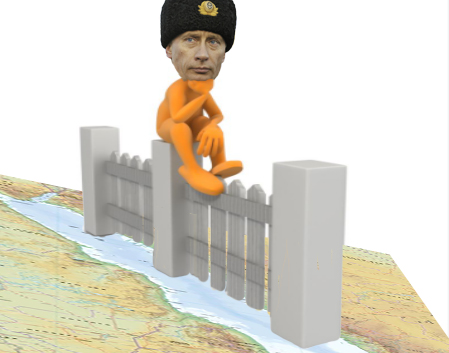
Not since Moses held out his hand and got the Israelites’ god to blow an easterly wind to part the Red Sea, has there been such a prodigious feat on that stretch of water. In the hours following the US and UK bombing and missile attacks on Yemen on Friday morning, the Kremlin ordered that a fence be constructed in the middle of the Red Sea on which President Vladimir Putin (lead image) has told Russian officials to sit.
The Kremlin order required the Foreign Ministry to reserve its condemnation of the attacks for the US and UK; ignore the Arab-Iranian alliance against Israel; and drop mention of Russia’s earlier commitment to regional Arab-Iranian negotiations with Ansarallah in the Yemen.
The reason is that President Putin refuses explicitly to attack Israel’s blockade of Gaza and genocide of the Palestinians, which are the declared targets of the Houthi operations and of its political strategy. Instead, Putin authorized his spokesman Dmitry Peskov to announce: “We have repeatedly called on the Houthis to abandon this practice because we believe it is extremely wrong”.
This was not a repeat. It is the first time since the start of the Palestine war on October 7 that a senior Russian official has characterized the Houthi operations in support of Hamas, or called on the Houthis to desist.
Putin’s fence-seat has also required the Russian Navy squadron to remain at its Syrian base at Tartous, and to limit its naval intelligence-gathering to the eastern Mediterranean, not the Red Sea, the Gulf of Aden, or the Arabian Sea moving east. The upgraded Kilo-class submarine Ufa, which had been expected to transit the Suez Canal and head east to a planned Pacific Fleet deployment, has been ordered to remain at berth at Tartous. No fresh Russian Navy reinforcements have entered the Mediterranean from Russia’s northern fleets, nor from the Pacific Fleet which were last seen in India, Myanmar, and Bangladesh in November.
Instead, the exit westward through the Gibraltar Strait of the fleet oiler Yelnya on December 29, followed by the fleet repair vessel PM-82 are signals the Kremlin has ordered the Navy to keep its distance from both war zones.
The General Staff and Defense Ministry are keeping public silence on the Anglo-American operations in the Red Sea as they were monitored in preparation; tracked on launch; and their results recorded on the ground. Instead, the Russian military bloggers led by Boris Rozhin of Colonel Cassad, the Militarist, and Rybar run by Mikhail Zvinchuk were reporting the aircraft and missile raids from 0130 Moscow time, several hours before the Associated Press, Reuters, and other western news agencies began their coverage. The milbloggers then followed the operations through the pre-dawn hours while the Anglo-American media remained silent. Almost in real time, the Russian sources were reporting the collaboration of Saudi Arabia, United Arab Emirates (UAE), and Qatar for airspace transit and US airbase attack launches; as well as the role of the Cyprus airbases for the British aircraft load and launch operations.
Within 90 minutes, Militarist reported “Yemeni sources: there is nothing new in their attacks, the same facilities that were bombed on March 26, 2015 were hit.” That was at 03:13 Moscow time. Fourteen minutes later Militarist reported that, according to an “official representative of the Houthis: ‘An American F-22 fighter jet was shot down over Sanaa.’” (Min 03:27). These aircraft are based at the US Air Force base at Al-Dhafra in the UAE.
No western media report of the first-ever Houthi success against a US warplane has subsequently appeared until the US Central Command (CENTCOM) issued a press statement, almost a day late, that “two U.S. Navy Sailors [are] missing off the coast of Somalia…Out of respect for the families affected, we will not release further information on the missing personnel at this time. The sailors were forward-deployed to the U.S. 5th Fleet (C5F) area of operations supporting a wide variety of missions.” If the “sailors” are in fact US Navy pilots, then the aircraft which the Houthis hit, forcing it to ditch in the sea, was likely to have been an F/A-18 from the USS Eisenhower.
By the time Moscow was fully at work on Friday morning, Rozhin concluded the raids had been a failure. Iran and Ansarallah hold the operational initiative, he said, and they are calling the US bluff.
“Previously, Iran could only block the Persian Gulf, which threatened a direct clash with the United States, as it was, for example, in the late 80s. Now [Iran] can block the Red Sea with the hands of the Houthis without risk to itself, offering the United States a hopeless war with the Houthis, whose religious concept includes a direct war with the United States and Israel.” (Min 18:49).
“The United States understands the game that Iran is playing, so they want to limit themselves to a demonstrative and ineffective PR strike, which should at least save the hegemon’s face and prevent Iran from dragging [Washington] into an exchange of blows with the Houthis. Therefore, even during and after the strikes, the United States declared its limitations and unwillingness to continue. But now the Houthis have the initiative, and they can force further steps by the United States, which they [White House] would like to avoid. To do this, it will be enough for them to hit several ships in the Red Sea and the Gulf of Oman in the next couple of days. This is exactly what Iran’s response may be, followed by a reaction to the expected actions of the United States, while the reaction, as usual, will affect the actions of Iranian proxies in Iraq and Syria.”
This was also the General Staff assessment reported to Putin.
Peskov’s attack which followed on the Houthis wasn’t so much a lie as “empty, nothing”. “I do not think he is lying,” a Moscow source commented. “Peskov is reaffirming what Putin told Keir Simmons [NBC interview, June 24, 2021] – we are not giving high-tech weapons to Iran and especially to a non-state player like Hezbollah or the Houthi. Yemen has been a fratricidal conflict – the Soviets and Russians have always steered clear of Shia-Sunni wars. But the Houthis have changed their status within a matter of weeks after October 7. The Kremlin too has been taken by surprise by the turn of events. [Since October 7] discussions would have taken place with Teheran and messages would have been sent through Iran with embassy-level contact [with Ansarallah] in Teheran.”
Rozhin has also reported the Russian military situation assessment that the Anglo-American targeting intelligence had been outdated, leading to bomb and missile hits on targets of no military value to the Houthi campaign against Israel-connected shipping. “The images confirm the fact of strikes at several Houthi sites. But the choice of targets raises certain questions: in particular, both the airports and harbours that came under attack were so badly damaged during the bombing of the UAE from 2015 to 2021 and have not been used for obvious reasons for a long time.”
ON THE FENCE – THE RUSSIAN NAVY KEEPS TO ITS SYRIAN PORT BASE
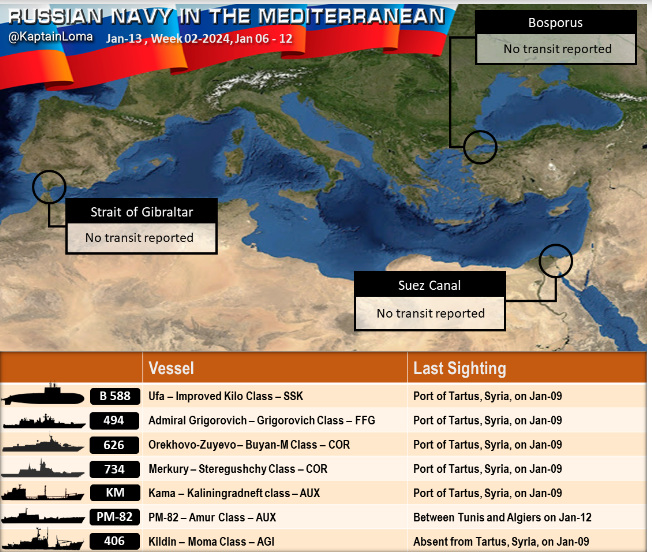
Source: https://russianfleetanalysis.blogspot.com/
A combination of the long Russian New Year holiday, which ended over the weekend, and active Kremlin dissuasion with media editors has largely silenced the state press organs. It is also too soon for the Russian oil companies and Sovcomflot, the state shipping company, to add their assessments of the impact on Russian oil shipments through the Suez Canal and the Red Sea in the coming days.
Houthi assurances of safe passage which Russian oilmen have been conveying to the Kremlin were reported here on December 20.
In the statement of the Russian representative to the United Nations, Vasily Nebenzya told the UN Security Council last Friday there is no legality in the UN Charter’s Article 51 nor in the Law of the Sea convention for the Anglo-American claim to “self-defence” in relation to commercial shipping at sea.
In the official US-drafted rationale for the attacks on Yemen, this claim was describedas “the inherent right of individual and collective self-defence, consistent with the UN Charter, against a number of targets in Houthi-controlled areas of Yemen. These precision strikes were intended to disrupt and degrade the capabilities the Houthis use to threaten global trade and the lives of international mariners in one of the world’s most critical waterways.”
STATEMENT OF ALLIED ATTACK INTENTION
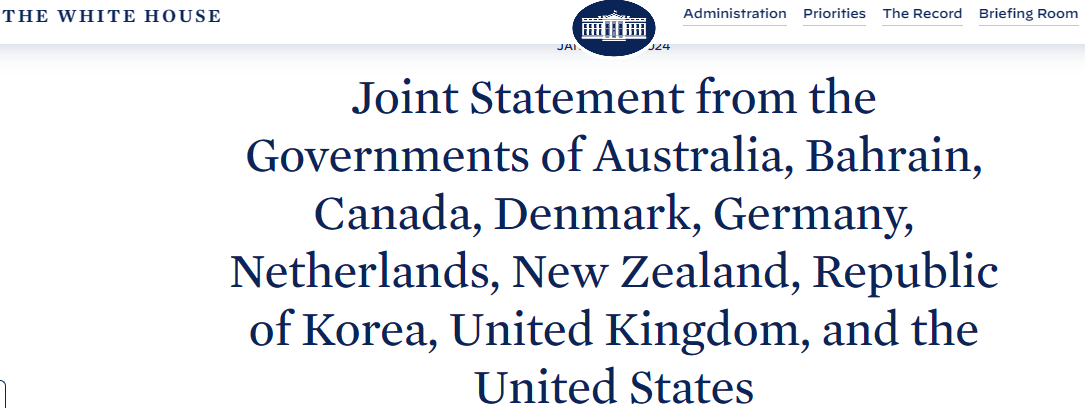
Source: https://www.whitehouse.gov
Moscow sources respond that the identified alliance is “absurd. The Netherlands, Australia, Canada and Bahrain did far less to assist the actual attack than Saudi Arabia, the UAE and Qatar in allowing their airspace to remain open for the preliminary overflights of drone and manned aircraft gathering intelligence, and then for the aircraft which attacked Yemen. Oman, it’s worth noting, refused and closed its airspace.” In the official Ansarallah response, the focus has been on “the American and British enemy [which] bears full responsibility for their criminal aggression against the Yemeni people, and it will not go unanswered. The armed forces of Yemen will strike at sources of threat and all hostile targets on land and at sea. The Yemeni Armed Forces confirm that they will continue to obstruct Israeli ships or those heading to the ports of occupied Palestine through the Red Sea.” January 12, 11:49 Moscow time.
SUMMARY DISPLAY OF JANUARY 12 STRIKE FORCE, YEMEN TARGETS
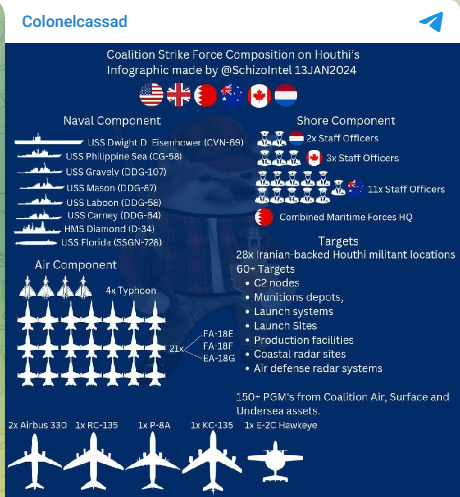
Russian source: https://t.me/boris_rozhin/109539
There is no mention that USAF F-22 aircraft participated in the attack from their UAE base.
RUSSIAN MAP OF ATTACK OUTCOME
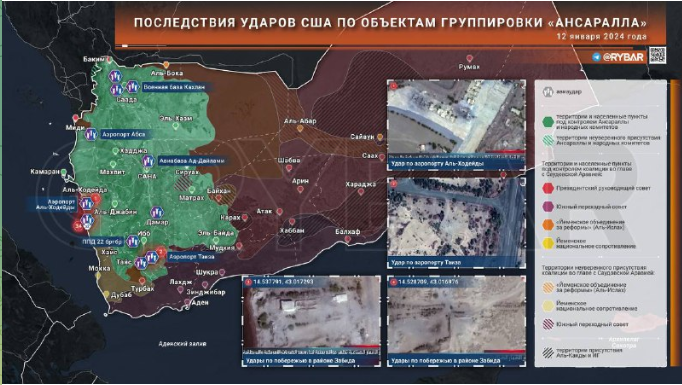
Click on source to enlarge and read details of the map locations and the satellite photographs of the ground damage. According to gCaptain, a leading US-based maritime publication, “USS Carney, the formidable Arleigh Burke-class guided-missile destroyer renowned for its role in safeguarding ships in the Red Sea last month, triumphantly returned to its base in the Persian Gulf. In a ceremony held in Bahrain, the entire crew was honored with navy combat medals for successfully neutralizing 14 unmanned drones launched by Houthi forces in the Red Sea… Operationally, the world is dazzled by the US Navy’s success…There is no doubt that the best combat ships of the US Navy are effective.”
The private Russian assessment remains guarded because the Russian priority – equally the Indian and Chinese priority – is to ensure that the exchanges of fire between the Anglo-American fleets and the Houthis do not impede or stop their shipping moving — and that is exactly what Ansarallah has promised. The western alliance of force against Palestine, and now against Yemen, has precluded any possibility of negotiations, either with Teheran or with Sanaa. Negotiations with both remain Russian policy.
Kremlin policy has also been to mask this; that’s to say, run camouflage while Putin reviews and reassesses what is to be done, and what is to be said.
In the late morning of Friday, Moscow time, the Foreign Ministry spokesman, Maria Zakharova, began her briefing with an extended response to the Anglo-American attacks. The Kremlin did not respond until Peskov briefed the press while Zakharova was still talking. The difference between the two did not become obvious until later, when the instructions were being discussed with Nebenzya at the Russian office at the UN in New York. Nebenzya did not start to speak at the Security Council until after midnight Moscow time on Saturday morning. His papers appeared to have included last-minute, handwritten changes to the typescript. Min 2:39:00 to 2:48:36.
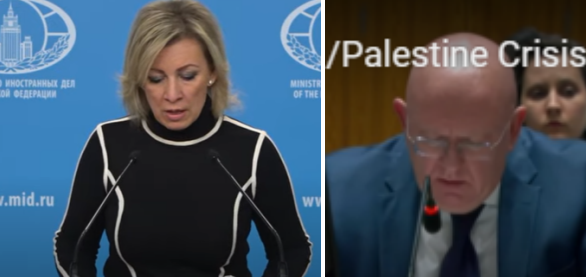
Left: Spokesman Maria Zakharova in Moscow. Right: UN Representative Vasily Nebenzya in New York -- min 2:39:00 to 2:48:36. About Nebenzya's 9 minute-30 second statement, there appear to have been last-minute changes in the text. He appears to have been ordered from Moscow not to mention Ansarallah, the recognized Yemeni government in Sanaa, nor Yemen’s right to regulate its territorial waters, especially at the Bab el-Mandeb Strait, including its right to exclude, defend against or attack hostile military vessels in the Red Sea. Nabenzya mentioned the US attack on Libya in 2011; he failed to mention the Reagan Administration’s bombing and missile raid on Tripoli on 1986. Nebenzya was also under orders not to link the Houthi operations with Israel’s blockade of Gaza, which Nebenzya had discussed separately earlier in the same Security Council session.
There was no criticism of the Houthis in the Foreign Ministry briefing – and also no mention of the Gaza war. “The international coalition,” Zakharova said, “which should be referred to as the illegal coalition led by the United States and the United Kingdom, conducted missile and bombing strikes on multiple sites in sovereign Yemen under the control of the Houthi movement, Ansar Allah. Reports indicate that the areas of Sanaa, Hodeidah, and Taiz, as well as the port of Midi in the Governorate of Hajjah, were targeted. In response to these attacks, the Houthis have declared their intention to retaliate against US facilities in the region. These events further affirm our concerns that the US position in the UN Security Council regarding the Red Sea is merely a pretext for further escalating tensions in the region.”
This was the consensus of the Foreign Ministry, the Defense Ministry and General Staff, the Security Council, and the Kremlin. But Zakharova then stumbled, revealing the extent of the disagreement which has developed in Moscow over Putin’s fence-sitting between Hamas and Israel, Ansarallah and Israel, and between what Putin has been calling terrorism and national liberation.
Zakharova was asked: “The UN Charter gives the right to any people who are under occupation to resist by any means available. Does Russia recognize the right of the Palestinian people to wage, among other things, an armed struggle against occupation?”
She answered: “Our support for a two-state approach to settlement speaks for itself. It has never been questioned and has a solid foundation. We recognize this right and reinforce our recognition with concrete diplomatic, international legal and international actions. I don’t understand why we should revisit this topic. This is not just a matter of our vision of this situation from the point of view of justice, law, and jurisprudence. This approach of ours, in addition to all of the above, is formed precisely from the point of view of the future of the region. No one has ever proposed another solution that could lead the region out of the terrible, terrible, long, protracted phase of the conflict. We really see that this two-state path is without alternative. Everything was tried. International players tried strength, as well as economic bonuses. What else?…Let’s not be led by the United States again, which imagines itself to have the right to single-handedly create the fate of peoples, millions of people at its own discretion. I don’t see any topic for an answer here, based on our basic position.”
The answer evaded the question. But just as significantly, there was no criticism of Ansarallah or the Houthi operations against Israel-connected shipping. For more details of how accurately the Houthis have identified these connections before launching their drone, missile, and boat attacks, read this.
Within minutes, Peskov reacted.
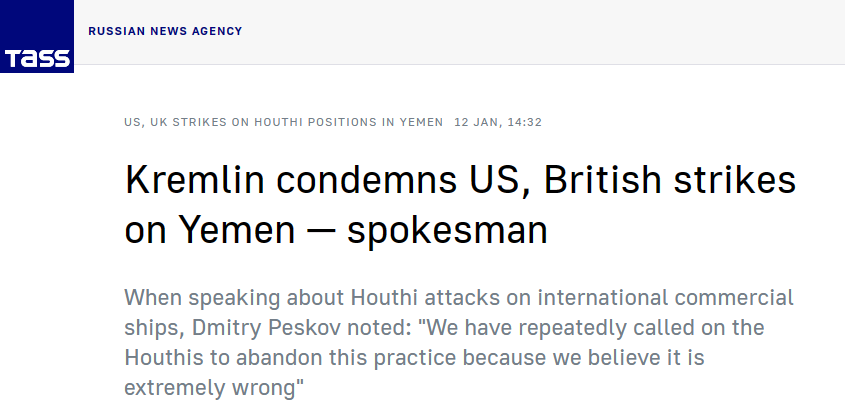
Moscow sources were asked if they have ever seen a statement from Putin or from the Foreign Ministry to substantiate Peskov’s claim. There has been none, they say.
The published record confirms this. A search of the Kremlin website indicates there has been no direct contact between Yemeni officials and Putin since 2013. In October 2019, in an interview with Arab pressmen, Putin gave his most comprehensive public discussion of his Arab policy. Then too he did not refer to or attack the Houthis or Yemen.
Instead, in focusing on Saudi Arabia, UAE, and Iran, he said: “First, if anyone thinks that seizing tankers and attacking oil infrastructure can in any way affect cooperation between Russia and our Arab friends, Saudi Arabia and the UAE, that they can undermine or break down our cooperation with OPEC+, then they are profoundly wrong. On the contrary, we will forge ever closer ties because our main goal is to stabilise global energy markets. Technically, we need to cut global reserves to some sensible level, so that these reserves do not affect prices. We have made some good strides and whatever we have managed to achieve has served not only oil producers, but also consumers. Neither producers nor consumers want high prices, rather we all want stability in the global market. Let me be straight with you, all that has been done under the leadership of Crown Prince Mohammed bin Salman. Overall, those were his initiatives, and we just backed them. Now we see that we did the right thing. We need to respond to any attempt to destabilise the market. Russia will certainly continue working with Saudi Arabia and other partners and friends in the Arab world to counter any attempts to wreak havoc in the market.”
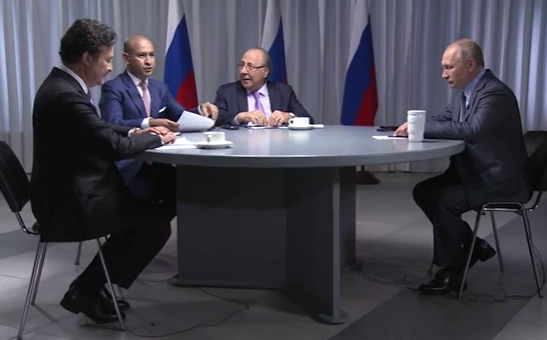
Source: http://en.kremlin.ru/
The date of the interview, October 13, 2019, followed the Houthi drone barrage which struck and damaged Saudi oil processing and storage facilities at Abqaiq and Kurais on September 14, 2019. The day after Putin’s interview he flew to Saudi Arabia and UAE.
Two years later, on June 24, 2021, Putin was asked by an NBC interviewer: “Keir Simmons: So, presumably you’d agree that giving Iran satellite technology that might enable it to target US servicemen and women in places like Iraq or to share that information with Hezbollah or the Houthis in Yemen so they could target Israel and Saudi Arabia, that giving Iran that kind of satellite technology would be dangerous? Vladimir Putin: Look, why are we talking about problems that don’t exist? There is no subject for discussion. Somebody has invented something, has made something up. Maybe this is just a bogus story so as to limit any kind of military and technical cooperation with Iran. I will say once again this is just some fake information that I have no knowledge about. For the first time I’m hearing about this information from you. We don’t have this kind of intentions. And I’m not even sure that Iran is even able to accommodate this kind of technology. This is a separate subject, a very high-tech subject.”
No record of a reference by Putin to the Houthis can be found since October 7. For evidence of Putin’s preference for the Saudi and UAE leadership, compared to the Iranians, read this and this.
The Foreign Ministry file is also empty of references to the Houthis, except that in 2017 the ministry issued a statement conceding that the Saudi-led blockade on Yemen, and Houthi missile retaliation, were “fraught with the escalation of hostilities, additional civilian casualties and the further aggravation of the critical humanitarian situation in the Republic of Yemen. It is clear that this scenario runs counter to what is needed to reach an early and long-lasting resolution of the Yemeni conflict, and delays any effort to restore stability and national accord in the country.”
This indicates the Russian view that the Houthi resort to force to defend Yemen against blockade was accepted during the Saudi war against the Houthis. The implication is that Arab force against the Israeli blockade of Gaza is equally acceptable in Russian policy. In 2017 the Russian policy advocated negotiations between the parties – “UN-mediated talks based on a broad consensus between the main Yemen political forces.”
In May 2021 Foreign Minister Sergei Lavrov, in talks with his Yemeni counterpart, was explicit that Russia was opposed to blockades like the one imposed by the Saudis on Yemen: “Russia continues to advocate the full lifting of the sea, ground and air blockade of Yemen and cancellation of all restrictions on the supplies of food, medications and other basic necessities to all districts in the country without exception. We urge all parties to the conflict to strictly observe the provisions of international humanitarian law and renounce combat operations that lead to the destruction of the civilian infrastructure and civilian victims.” About the problem of salvaging the oil storage vessel Safer, and preventing a massive Red Sea oil spill, Lavrov said: “We urged the parties involved to settle the conflict over the oil storage vessel Safer that is moored near Hodeidah through cooperation between the Ansar Allah Houthi movement and the authorised UN agencies.”
Here is more on the Safer salvage story:
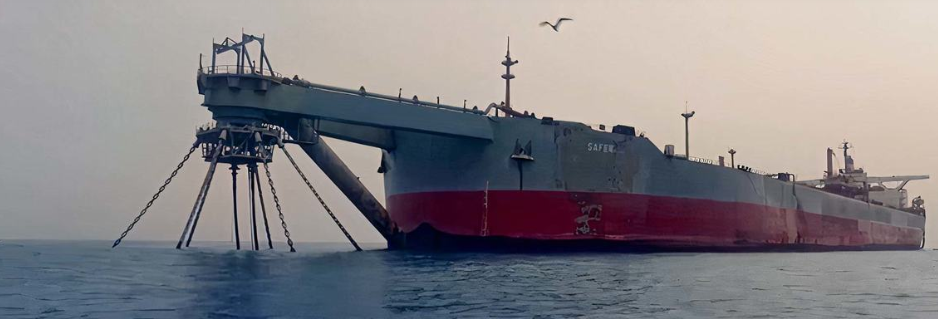
Source and details: https://news.un.org/
The last statement on Yemen by a Russian diplomat was in January 2022; it was even-handed towards all parties, including the Houthis. In the 74 references to the Houthis in the Foreign Ministry archive, there has not been a single word of criticism since October 7 — and no reference at all until Zakharova’s briefing last Friday.
Moscow sources believe that when Peskov intervened after Zakharova’s briefing to attack the Houthi blockade-busting operations, he was misrepresenting what the Foreign Ministry and Defense Ministry think, and what the Security Council has discussed. But Peskov, the sources think, was not exactly lying – he was revealing what Putin thinks in private but has not said in public.
The question Russian sources discuss, also in secret, is why Putin thinks this. The effectiveness of the Russian oil lobby, led by Rosneft chairman Igor Sechin, to assure bilateral security arrangements for Russian oil movements towards India and China, has subordinated Putin’s claim to be defending “energy security” in the Red Sea.
The extent of Russian military collaboration with Iran is top secret, and Putin will not interfere with it, not least of all because it directly affects Russian operations in the Ukraine war. The General Staff position can be inferred from the milbloggers, this time led by Rozhin who worked all through the Moscow night to report what was happening; cautioned against fake photographs and unsubstantiated strike reports; and concluded with this Russian military appreciation: “Now the initiative is with the Houthis. The next move of the United States depends on where and how they strike. The United States will not be able not to respond, because if they do not respond, it will look like weakness. Therefore, the United States will be forced to continue. Therefore, the following moves are actually a forced option.”
Moscow military observers agree – this is a defeat for the US at the tactical, operational, and strategic levels.
“Iran will not enter into any war,” according to Rozhin. “This is the basis of its strategy. Iran’s goal, avoiding direct war with the United States and Israel, is to support their wars with their proxies as much as possible – in Lebanon, Syria, Iraq, and Yemen. This is [Iran General Qassem] Suleimani’s strategy. It does not provide for quick victories and blitzkriegs – the task of Iranian proxies in the region is to draw Iran’s enemies into endless multi-year wars and exchanges of blows, in which the enemy gets stuck in the sand, without achieving any operational or strategic goals. This is the concept of strategic exhaustion, which fully corresponds to the basic provisions of the indirect action strategy described by [British strategist B.H.] Liddell Hart. By implementing this strategy, Iran has achieved a lot — despite all the opposition, it has strong positions in Iraq, Syria, Lebanon, Yemen and Palestine. While the enemies have been trying chaotic tactics with strikes against Iranian proxies, Teheran has consistently expanded its influence over the entire region.”
“Iran’s main action program now [is] support for the resistance in the Gaza Strip.
Support for Hezbollah strikes in Northern Israel. Rocket attacks on Israel from Iraq and Yemen. The shelling of American military bases in Iraq and Syria. Support for the withdrawal of American and NATO troops from Iraq. Support for the Houthi naval campaign in the Red Sea and the Gulf of Aden. But do not expect drastic steps from Iran – it is playing for the long term, and is quite ready to convert its human and materiel costs into a strategic result.” — January 12 at Min 18:49.


Very detailed article but Military Summary suggested yesterday that Russia and Iran had agreed to respect and presumably defend each others sovereignty.If this has legs this is definitely not fence sitting!
In addition Iran flexed it’s muscles yesterday with a strike against Mossad,and a US base.Coincidenc?
Very detailed summary but yesterday Military Summary Channel suggested Iran and Russia had concluded an agreement to respect and presumably defend each others sovereignity.
If true this is definitely not fence sitting! In addition yesterday Iran apparently hit Mossad and a US base with long range missiles.Coincdence?
Looking at those deployments, it seems that the Russians have decided not to over-extend themselves here. After all this was a RAND study plan – to overextend Russia. So they are sticking by their Syrian base and have negotiated free passage with Yemen of their ships. (In passing, I was reading today that LPG ships have decided not to go near the Red Sea at all. That is probably a very wise idea that, especially after that US ship was hit by an anti-ship missile.) Sooner or later this war will come to a close and it will be time for negotiations, whether Israel likes it or not. You think that the world will accept the US being a broker here? Or the UK? If there are negotiations to be done, I suspect that it will be China or Russia doing them. Those countries that had decades if not centuries of neutrality such as Sweden, Switzerland, Austria & Finland have thrown that reputation away the past two years so there are not that many countries left that can be considered neutral venues. China and Russia may be acceptable as such.
Consider that Russia is not reactive, rather patient, deliberate and strategic, looking at their own interests first. Decreased stability in the ME does not meet their needs (other than funneling support from Ukraine). Escalation serves nobody. Moreover, they generally don’t engage with non state actors. Fence sitting in these circumstances is an appropriate strategy.
Likewise in Ukraine, they could go on the offensive and defeat them tomorrow, but instead are watching an waiting for the domestic political instability to define itself and also how much funding there will be going forward. Then they will make their next move.
At least that’s how it looks to me.
If escalation serves nobody, why are Israel and the US escalating? Answer, because escalation does serve some parties interests. It also serves Hezbollah’s interests (attriting the IOF) and to some level, Iran’s, and most definitely the Houthi’s.
Its also clear escalation serves Russia’s interests, irrespective of public declarations. The US getting bogged down, depleting its missile reserves in the middle east, losing respect in the global south, being seen as genocide-enablers, etc., etc., all are clearly in the Russian interest. So are decreased middle eastern energy supplies to Europe – let’s not forget who is talking about escalating in Ukraine. Sad fact is there are a lot of parties who benefit more from moving slowly up the escalation ladder.
Uncontrolled escalation is another story.
I wonder if Putin is waiting for the outcome of the ICJ on the Gaza genocide. He always considers international law first and foremost. Even if he recognizes the “international rules based order” as BS, which it is, he seems very careful to respect international law.
The events of October 7 and beyond have been helpful to Russia. Up to that point, the West’s position had been very narrowly defined as Russia breaking inviolable laws regarding international borders. That was a weak argument before, but now has been blown out of the water. The U.S. military is all over the place, whether invited or not. Russia is defending Russian nationals in its own neighborhood. Israel is an obvious outgrowth of Western imperialimsm, and the U.S. is broadcasting its imperialist bonafides.
I think Russia is sitting on the fence because it can and is in Russia’s interest. The question is, what benefit does Russia get by not sitting on the fence? Not much.
That said, once the ICJ rules, it probably will be time to get off the fence. How far off, I am not certain.
I would guess China and India are in the same position. Nobody wants to get on the bad side of nuclear-armed Israel if the Israelis are able to maintain their power, so there has to be some tangible benefit for them to get off the fence. Plus Putin and Modi supposedly have stronger personal connections to Netanyahu than, say, Biden does, no matter what contrary views others in their governments may have. The whole conflict is fraught with bad outcomes for anyone that makes a major misstep. The US may be heading for one of those bad outcomes, but seems blithely unconcerned, or maybe unaware.
Why would Russia get involved when doing so adds little value to strategic objectives when US & UK are doing such a good job achieving them on Russia’s behalf?
Russia likely less worried about relations with Israel than potential for any involvement leading to counterproductive outcomes in US. At least in the short term with president election coming up. If Biden pops due to too much stress associated with global events it would open up a can of worms Russia likely prefers to avoid. While Israel is headed towards becoming a failed state (pre-Gaza as a result of Netanyahu trying to stay in power) Russia also likely wants to avoid unnecessarily attracting the ire of Israel lobby in US while it has its hands full with
MordorUkraine.In the West, there are a fair amount of anti-US Imperialist voices who support Russia and support Gaza driven primarily by objection to US Imperialism and/or rooting for the underdog sentiments (depending on whether you see the Russo-Ukrainian War as Russia vs. NATO or Russia vs. Ukraine).
Russia is a stone-cold realist as it gets, and so the fact that they are not committing ideologically to one side in the Israel/Gaza issues is consistent with their realism. What is in it for Russia? They see benefit from the relationship with Syria and Iran, and so they provide a certain level of support. They have problems with Muslim separatists so they are not particularly enthusiastic about the Hamas or the Muslim Brotherhood. They get some benefit from their relationship with Israel (after all, who else is going to buy US intelligence that the Israeli’s steal?):
https://www.theguardian.com/world/1999/jan/12/julianborger1
I would argue that the Russians are not nearly as anti-Western as the commentariat makes them out to be, the real issue is the West is so virulently anti-Russian that Russia has to play some kind of tit-for-tat response so as to not look like a punching bag. I suspect the Russians are willing to make a mutually beneficial deal with anyone, and aren’t going to stick their necks out on ideological grounds in any dispute unless it directly threatens Russian interests like NATO expansion, and not like the Gaza genocide/humanitarian crisis.
At this time, the Russians possess an enormous amount of power in the ME because they are selling combat jets to Iran. Depending on what they sell Iran and in what quantity, they can nullify any advantage Israel has relative to Iran in air power, and the Russians have the best AD in the world. The level and amount of Russian military support to Iran is probably far more important than whatever position Russia takes in the UN or ICJ or any of these other international/diplomatic issues. As people mentioned, Iran and Russia are finalizing some kind of treaty and it has been announced that there will be some kind of mutual defense provisions included, the devil being in the details as usual. Israel can’t afford to alienate Russia any further if they want to survive.
Wow tons of information and very informative. Seems to be a very dangerous situation throughout the Middle East with many players and multiple agendas creating many layers of conflict. Russia seems to be or maybe it is Putin seems to be walking a dangerous path trying to please everyone. Or maybe that is a cunning strategy to let the cards be played by others before revealing your hand. Or maybe there is some point of contention raising concerns about Putins conservative approach to everything within thee ruling class. Very interesting times with so many flash points here and all around the world. Thank you for the update.